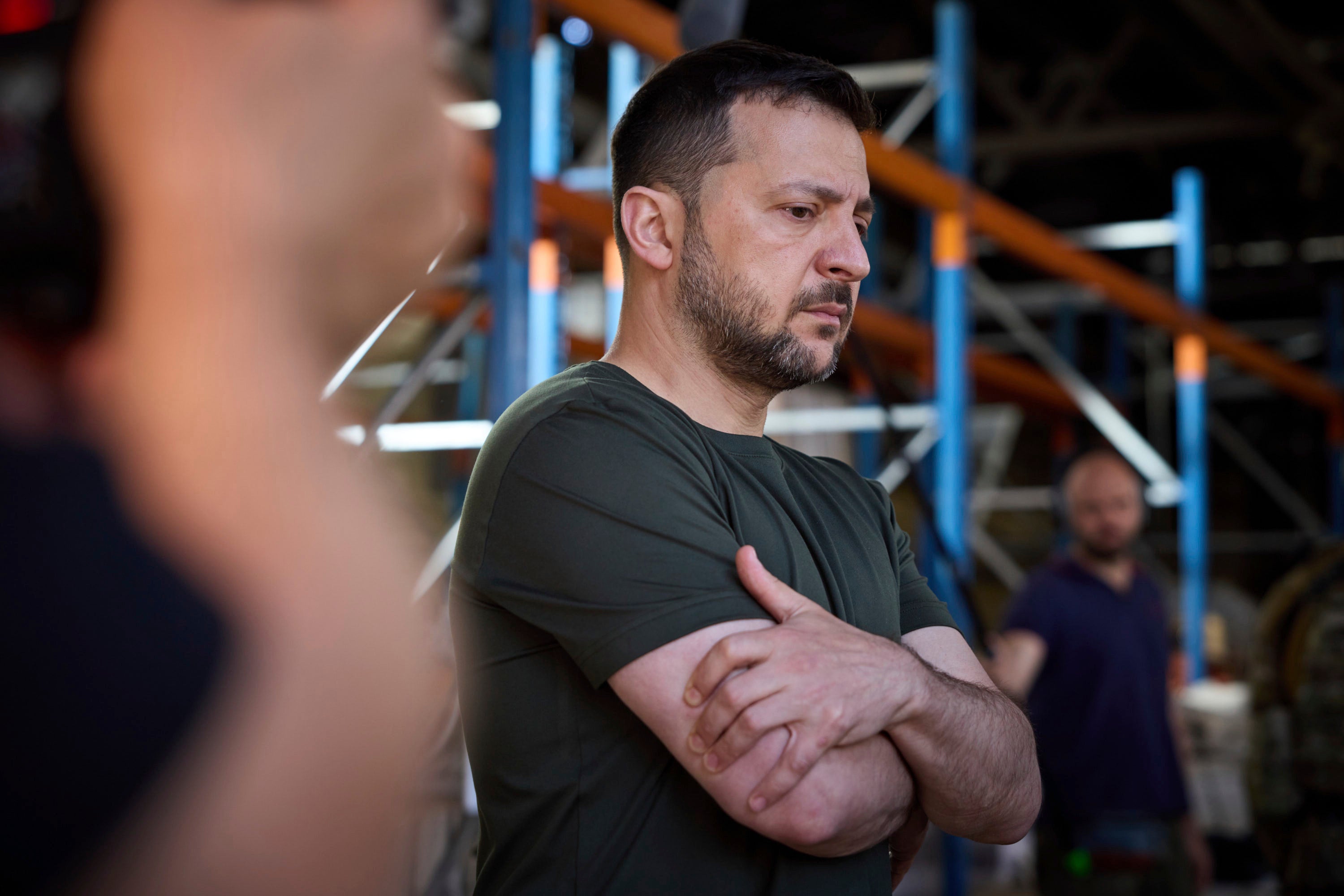These Ukrainians fear they will be the next target for Putin’s forces – but they will fight to the last
Askold Krushelnycky reports from Sumy, near the border with Russia. About three hours’ drive from the fierce battles around Kharkiv, the area is preparing for its own assault by Moscow’s troops


The city of Sumy is about 100 miles north of Kharkiv, but a similar distance from the Russian border. Ukraine’s president Volodymyr Zelensky and his military and intelligence chiefs – as well as Western intelligence – believe it could be the next target for Russian forces to attack.
Earlier this month, Moscow launched an attack against the Kharkiv region and swiftly took a string of villages. Battles are still raging as Ukrainian forces desperately try to prevent Russia’s artillery coming within range of the area's capital, Kharkiv, Ukraine’s second-largest city.
Zelensky has said Kyiv’s forces have secured “combat control” of areas where Russian troops entered across the border into Ukraine, although Moscow claims its forces are still in control of some areas.
Moscow’s forces have stepped up attacks, including small-scale incursions by commando units, along the Sumy region’s border areas and those of the neighbouring Chernihiv region to the west. They attacked the Sumy region 108 times in 25 separate attacks in a single day earlier this week. Targeted settlements included Velyka Pysarivka, Bilopillia, Yunakivka, Khotin, Krasnopillia, Druzhkivka, Seredyna-Buda, Vorozhba and Esman, with some 1,500 people evacuated.
Russia has also continued to strike at targets in the Kharkiv region, destroying civilian buildings, trains and railway tracks. Authorities say more than 11,000 people have been evacuated from towns and villages in the region since Russia launched its assault on 10 May.
Vladimir Putin has claimed he wants to carve out a buffer zone on Ukraine’s side of the border to prevent Ukrainian attacks on Russian towns such as Belgorod.
However, the head of Sumy’s Regional Military State Administration, Volodymyr Artiukh, believes Putin is trying to grab as much Ukrainian territory as possible to use as bargaining chips in future peace talks.

Artiukh says: “The events in Sumy and Kharkiv are deeply intertwined. Historically, we know all wars have a start, and they must come to an end. The important thing is on what terms the war ends.
“Wars are about gaining territory and human and economic resources. When Putin started this war he expected to quickly gain territory and a large educated population that he could exploit for his grand imperial ambitions... Ukraine did not allow the would-be tsar to achieve that. But now Putin needs some sort of dividends to show for what he has inflicted on his country.”
Artiukh’s contention that Putin is trying to grab territory ahead of some kind of peace negotiations chime with a Reuters report citing Kremlin-connected sources saying the Russian leader wants to at least freeze the conflict.
According to that report, Putin is ready to halt the war in Ukraine with a negotiated ceasefire that recognises the current battlefield line – saying he is prepared to fight on if Kyiv and the West do not respond.
Ukrainian foreign minister Dmytro Kuleba said on X, formerly Twitter, that the Russian leader was trying to derail a Ukrainian-initiated peace summit in Switzerland next month by using his entourage to send out “phoney signals” about his alleged readiness to halt the war.
Artiukh, 66, was a career soldier who was a lieutenant-general and deputy chief of the Ukrainian Armed Forces General Staff when President Zelensky appointed him to his present post. He brings decades of military experience, which he has applied to strengthening the region’s defences along its 370-mile border with Russia. He has often shown up in person to check on the construction of trenches, bunkers, and barbed-wire defences near the front lines.
Some towns and villages in Sumy, but not the regional capital of Sumy itself, had been occupied for a few months at the start of Putin’s 2022 invasion. But even then, Artiukh says, most of the population waited for Ukrainian forces to retake the areas and many formed partisan groups to sabotage the enemy or gather information about it to hand over to the regular forces.

He adds: “We have watched carefully what has happened in Kharkiv and we’re always trying to improve our fortifications. You can never do enough but the morale of our people – military and civilians – is high and the Russians won’t be able to get what they want here.”
Artiukh thanks Britain for being the first country to help in 2022 with major arms shipments, and more recently for suggesting British weapons be used against targets within Russia itself – something the US and other allies are hesitant about, fearing an escalation of the conflict.
“We are a much smaller country with fewer resources than Russia, and so we can only gain victory by devising ourselves or receiving from allies modern weapons and equipment,” Artiukh says. “We have strong moral support from our people and that is essential and means we can, we must, we will fight our enemy. We have to beat him, beat him, beat him – that’s all he [Putin] understands.”
He appealed for all Western allies to completely commit to ensuring Ukraine wins. “Everyone must step up,” Artiukh adds.
He says he receives a constant stream of information from the Ukrainian army general staff about Russian preparations around Sumy and believes the region is prepared to tackle anything the Russians do.
Okhtirka, in the Sumy region, lies along the main road between Kharkiv and Sumy cities. Its population has been swelled by refugees in the last few weeks due to attacks across the border by Russian bombs, drones and artillery. Air-raid sirens have been sounding more frequently of late.
Oleksandr Belousov, 27, an employee of the city’s cultural and community centre, points to the rubble-filled space that is all that remains of the city hall after Okhtirka was attacked at the start of Russia's invasion in February 2022.
“It was destroyed by Russian aeroplanes bombing us at night on 7 March, 2022,” he says. “We had no air defences and they just bombed without us being able to respond.”
For Ukrainians like Belousov, who live close to the Russian border, the recent Russian attacks have focused attention on the American ban – backed by some of Kyiv’s allies who have supplied weapons – forbidding their missiles being used against targets in Russia itself.

Russia has taken advantage of the ban to mount devastating artillery and glide-bomb attacks with impunity from sometimes just a few miles across the border inside Russian territory. The glide bombs are old conventional “iron” bombs of the type dropped by planes from before the Second World War. They are fitted with wings to extend their range to tens of miles by “gliding”, with GPS systems for accuracy.
Russia has hundreds of thousands of these bombs, some weighing a tonne-and-a-half and packing hundreds of pounds of explosives.
Belousov is from Velyka Pysarivka, a town largely destroyed by Russian artillery, planes and glide bombs last month. He says: “The Russians dropped 200 glide bombs on Pysarivka and the area in one week. If only we’d been given what we need: [either] permission to fire missiles into Russian territory to destroy the Russian planes launching them, or F-16s to intercept their planes and destroy their air bases, [then] Pysarivka would still be intact.”
Belousov has registered for military service but has not yet been called up. He carries the relevant documents with him in case he is stopped by one of the joint military and police patrols checking on men in the street to see if they are registered or trying to avoid call-up. He says: “The Russians have a choice: they can come here and die or they can stay in their own country. We don’t have that choice. So we have to fight.
“Can the Russians come here? Yes, they can try and everyone will fight them. I have a six-year-old daughter, Alissa. I want her to live in a free Ukraine, not a Russian dictatorship or as a refugee abroad,” he adds.
He praises Britain in the wake of the foreign secretary, David Cameron, saying on a visit to Kyiv earlier this month that Ukraine has the right to use UK-supplied weapons whichever way out deems best, including inside Russia.
Belousov says: “The Americans and other Western leaders have to follow Britain’s example and be decisive. They should overcome their fears about escalation and get the ‘red lines’ they imagine Putin has drawn out of their heads.
“When Putin invaded in 2022 he boasted he would take Kyiv in a few days and the rest of Ukraine in a couple of weeks. Well, here we are more than two years later and what’s he going to do? Use nuclear weapons? I don’t think so. If the West doesn’t want to see its own democracy destroyed, let alone Ukraine defeated, then it has to arm Ukraine with everything we need and allow us to take the battle to Russia.”
As if to emphasise his words, air-raid sirens begin to sound.
Join our commenting forum
Join thought-provoking conversations, follow other Independent readers and see their replies
Comments
Bookmark popover
Removed from bookmarks